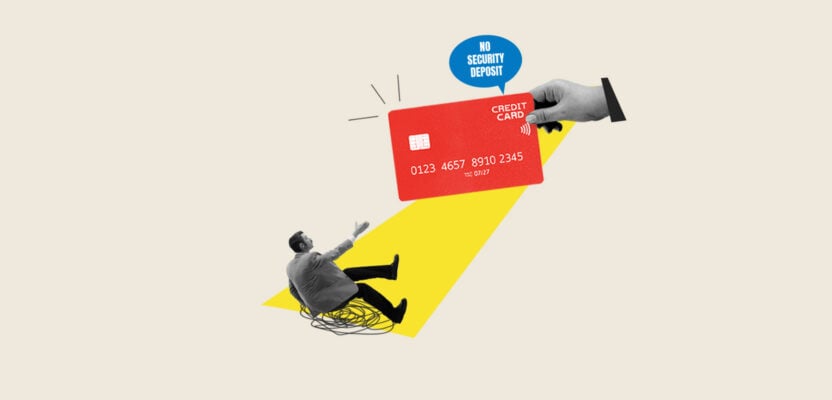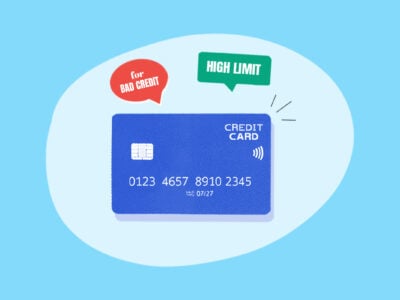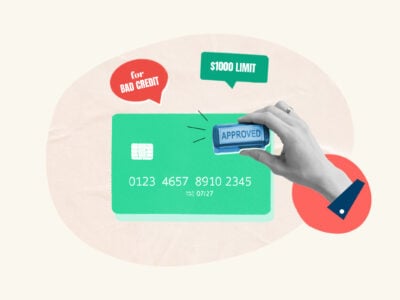Second-Chance Credit Cards with No Security Deposit
| Credit Card | Best For | Credit Score | Annual Fee | Welcome Bonus |
|---|---|---|---|---|
| Overall | 300–669 | $39 ($0 for the first year if you set up autopay) | ||
| No Checking Account | 300–669 | $0–$49 | ||
| No Annual Fee | 580–739 | $0 | ||
| Rebuilding Credit | 300–669 | $75-$99 | ||
| Guaranteed Approval | 300–669 | $75 for the first year ($48 after) |
Table of Contents
Getting back on your feet after experiencing financial difficulty is tough, especially when you’re working with a bad credit score. However, using a credit card to build your credit is an effective strategy for getting your borrowing history back on the up and up.
Unfortunately, credit card companies offer very few credit cards to borrowers with bad credit histories. There are even fewer choices available if you’re not willing to put down a security deposit on a credit card. However, unsecured (no deposit) second-chance credit cards do exist, and we’re here to help you find the best one. Check out our top 5 picks for second-chance credit cards with no security deposits.
What’s a second-chance credit card?
A second-chance credit card is a credit card that’s available to borrowers with bad credit histories. For example, if you have a low credit score, defaulted loans, bankruptcies, foreclosures, or other derogatory marks on your credit report, you may have a bad credit history.
This makes qualifying for a loan or line of credit difficult. However, some banks and credit card issuers offer cards specifically for borrowers with this type of credit, giving them a second chance at borrowing responsibly.
Even better, many of these are designed as credit cards for building credit, helping borrowers with bad histories build back their credit and qualify for better loans in the future.
How do I get a second-chance credit card?
There are two ways you can get a second-chance credit card:
- Put down a security deposit: Most second-chance credit cards are secured credit cards, meaning they require a security deposit. The deposit acts as collateral in case you don’t pay your bills, so lenders are more likely to qualify borrowers with bad credit for these cards.
- Apply for an unsecured credit card: If you don’t want to pay a security deposit, there are still borrowing options available. However, they’re more limited and often come with high fees and interest rates (listed as the credit card’s APR). Look for an unsecured second-chance credit card that reports to the three major credit bureaus (which is important for building credit), offers high approval odds, and doesn’t have exorbitant fees or APR.
The following second-chance credit cards are all unsecured, meaning they don’t require a deposit. To qualify, you’ll most likely need to go through a pre-approval process, then submit an official application. Many of the following cards offer instant approval, making the application process fast and allowing you to start rebuilding your credit with a credit card as soon as possible.
5 best second-chance credit cards with no security deposits required
Here are the 5 best credit cards without security deposits for people who need a second chance at borrowing responsibly.
Overall best second-chance credit card with no security deposit
Prosper® Card
Rating Breakdown
Fees
4.8Compared to other unsecured cards for less-than-perfect credit, the Prosper® Card offers more bang for your buck, with a relatively low annual fee and no cash advance fees.
APR
1.8The Prosper® Card comes with a pretty broad APR range, and there’s a good chance you’ll end up with a high interest rate.
Rewards
1.0Because the Prosper® Card doesn’t offer any credit card rewards, it earns the lowest possible score in the rewards category.
Credit Reporting
5.0The Prosper® Card issuer reports activity to the three major credit bureaus.
Credit Limit
4.5Generous credit limits and a willingness to offer credit line increases very soon after account opening earn this card a high rating in this category.
Other
We adjusted the rating for additional factors like the lack of a security deposit and the short time period before cardholders are eligible for credit line increases.
|
Annual
Fee
$39 ($0 for the first year if you set up autopay) |
Credit
Score
300–669 |
|
Purchase
APR
22.74%–33.74% (variable) |
Credit
Limit
$500–$3,000 |
Why It's Great
The Prosper® Card is a unique offering among unsecured credit cards for bad credit. It gives second chances to borrowers with bad credit histories or limited credit, has high potential credit limits, and only charges a low annual fee that can be waived the first year.
Unlike most credit cards for bad credit, the Prosper® Card offers initial credit limits between $500–$3,000. This is well above the limits on comparable cards, giving borrowers a lot of potential spending power.
If you’re working to repair a poor credit history, having a high credit limit can help. An important factor in your credit score is your credit utilization rate, which is determined by how much of your credit you’re using at a given time. If you have a high credit limit, it’s easier to keep your utilization rate low—which can improve your credit score.
Pros & Cons
Pros
- No deposit required
- No cash advance fees
- Fast application
- Credit limit increases available after 3 months
- Foreign transactions are available
Cons
- High APR
- $39 annual fee
- No rewards
- No welcome bonus or intro offers
- Balance transfers not available
Second-chance credit card with no deposit and no checking account required
Oportun® Visa®
|
Annual
Fee
$0–$49 |
Credit
Score
300–669 |
|
Purchase
APR
24.90%–29.90% (variable) |
Why It's Great
What makes the Oportun® Visa® such a good second-chance credit card is that it also doesn’t require a checking account. So if you’re just getting back on your feet financially, this card may be the perfect resource for you.
It’s a starter credit card for borrowers with bad, no, or limited credit histories, and is marketed especially to new immigrants to the US. Uniquely, it doesn’t require any form of US identification to apply, including a Social Security number or ITIN.
The Oportun® Visa® is a great way to build credit if your history is lackluster, especially if you aren’t financially established in the US. The issuer reports your borrowing activity to the three major credit bureaus, meaning you can quickly improve your credit by making consistently on-time payments to your credit card account.
Pros & Cons
Pros
- Cash advances available
- No foreign transaction fees
- No credit score required
- No social security number or US ID required
- Credit reporting to all three major bureaus
Cons
- Annual fees usually apply
- No cashback rewards
- High APR
- Residents in some states are excluded
- No introductory offers
- No balance transfers
Second-chance credit card with no deposit and no annual fee
Capital One Platinum Mastercard®
|
Annual
Fee
$0 |
Credit
Score
580–739 |
|
Purchase
APR
28.49% (variable) |
Why It's Great
The Capital One Platinum Mastercard® offers borrowers low-cost resources for building or rebuilding credit. The card comes with very few fees, including no annual fee, startup fee, monthly fees, or even foreign transaction fees.
Additionally, Capital One is one of the best credit card issuers for borrowers taking control of their credit, as they offer impressive credit-building resources and tools. You’ll get free credit scores, credit monitoring, and even free credit support and explainers through a program called CreditWise.
Capital One states that this card is for borrowers with “fair” credit, which they specify as people who meet any of the following conditions:
- Have defaulted on a loan in the past 5 years
- Have limited borrowing history
- Have had their own credit card or been an authorized user on a credit card for less than 3 years
- Are new to borrowing, including students and new immigrants
If your credit history includes more than one defaulted loan, or worse marks such as bankruptcy, you may need to get the secured version of this card: the Capital One Platinum Secured. Luckily, the card allows you to graduate to the Platinum unsecured and will refund your security deposit upon graduation.
Pros & Cons
Pros
- No annual fee
- Borrowers who have defaulted on loans can qualify
- Credit-building tools
- No foreign transaction fees
- Balance transfers are available
Cons
- Borrowers with multiple defaulted loans or bankruptcy may not qualify
- No rewards
Best second-chance credit card with no deposit for rebuilding credit
Credit One Bank® Platinum Visa® for Rebuilding Credit
Rating Breakdown
Fees
3.8The Credit One Bank® Platinum Visa® for Rebuilding Credit comes with pretty high fees, especially the annual fee. Thankfully, it’s partially offset by rewards and other benefits.
APR
2.4The APRs on this card are pretty high, but this is typical for a credit card geared toward people with poor or limited credit histories.
Rewards
3.1This is one of the few unsecured rewards cards you can get with poor credit. However, the rewards don’t apply to all purchases and don’t fully compensate for the card’s fees.
Credit Reporting
5.0Credit One reports to all three credit bureaus, which makes the Platinum Visa® for Rebuilding Credit suitable for building or rebuilding credit.
Credit Limit
2.5Credit limits are pretty low on this card, which isn’t ideal if you want to raise your credit score quickly or take full advantage of the card’s cashback rewards.
Other
We manually adjusted the card’s final score to account for factors like free credit scores and credit limit increases.
|
Annual
Fee
$75-$99 |
Credit
Score
300–669 |
|
Purchase
APR
26.99% (variable) |
Rewards
-
Gas, Groceries, & Telecom Bills
1% cash back on eligible spending toward gas, groceries, mobile phone service, and internet, cable, and satellite TV service
Why It's Great
The Credit One Bank® Platinum Visa® is designed for borrowers with bad borrowing histories who need to rebuild credit. Not only does it come with no security deposit, but it also has incredibly high approval odds, usually instant approval, and a cashback rewards program.
It boasts 1% cash back on the following purchases:
- Gas
- Groceries
- Your monthly mobile phone, internet, cable, and satellite TV services bills
Along with cashback rewards, the card offers credit-building resources like monthly credit reporting, Experian credit report monitoring, flexible due dates, and customizable account notifications.
But keep in mind that there’s a high annual fee of $75 the first year, and $99 each year after that.
Pros & Cons
Pros
- No deposit required
- Cashback rewards
- Free credit reports
- Credit reporting
Cons
- High annual fee
- Limited rewards
- Low credit limit
- Balance transfers not available
Best second-chance credit card with no deposit and guaranteed approval
Total Visa® Card
Rating Breakdown
Fees
3.1This card comes with high fees, which makes it an expensive card to maintain. You also don’t get many benefits in exchange for your money.
APR
1.2This card comes with one of the highest APRs you’ll find on a standard credit card, putting cardholders at very high risk of accumulating credit card debt.
Rewards
1.0The Total Visa® Card doesn’t come with any credit card rewards, earning it the lowest rating in the rewards category.
Credit Reporting
5.0Total Visa® accounts are reported to all three major credit bureaus, making it suitable for building or rebuilding your credit.
Credit Limit
2.5The initial credit limit on this card is relatively low at just $300. However, credit limit increases are available.
Other
We made adjustments for factors like high approval odds, program fees, and the availability of credit limit increases.
|
Annual
Fee
$75 for the first year ($48 after) |
Purchase
APR
34.99% (fixed) |
|
Credit
Score
300–669 |
Credit
Limit
$300 |
Why It's Great
If you’re looking for a second-chance credit card with the highest possible approval odds, set your sights on the Total Visa®.
The Total Visa® can be considered a guaranteed-approval credit card, as almost every applicant qualifies, usually with instant approval. The application process is quick and easy, and you’ll only be asked to provide the following information:
- Name
- Email address
- Physical address (no P.O. boxes)
- Phone number
- Date of birth
- Social Security number
- Employment status
- Net monthly income
- Estimated monthly expenses
While it’s one of the most accessible second-chance credit cards around, beware that there’s a program fee of $89 that will be taken out of your initial credit line. The card charges other fees as well, making it the most expensive on this list, but also the easiest credit card to get among these borrowing options.
Pros & Cons
Pros
- No deposit required
- Reports to three credit bureaus
- Potential credit limit increase
- Easy application
- Instant approval
Cons
- High APR
- Program fee
- Annual fee
- Monthly servicing fee
How we rate our credit cards
Getting a new credit card can be tough, especially when you have less-than-perfect credit. That's why we heavily weighted the following factors when determining the best second-chance credit cards without security deposits:
- Qualification requirements
- Fees
- Interest rates
- Credit limits
- Benefits
- Borrowing terms
These factors, among many others, are part of our 5-star credit card rating methodology for all card categories. Our star ratings are unbiased and independent of our affiliates and advertisers.












